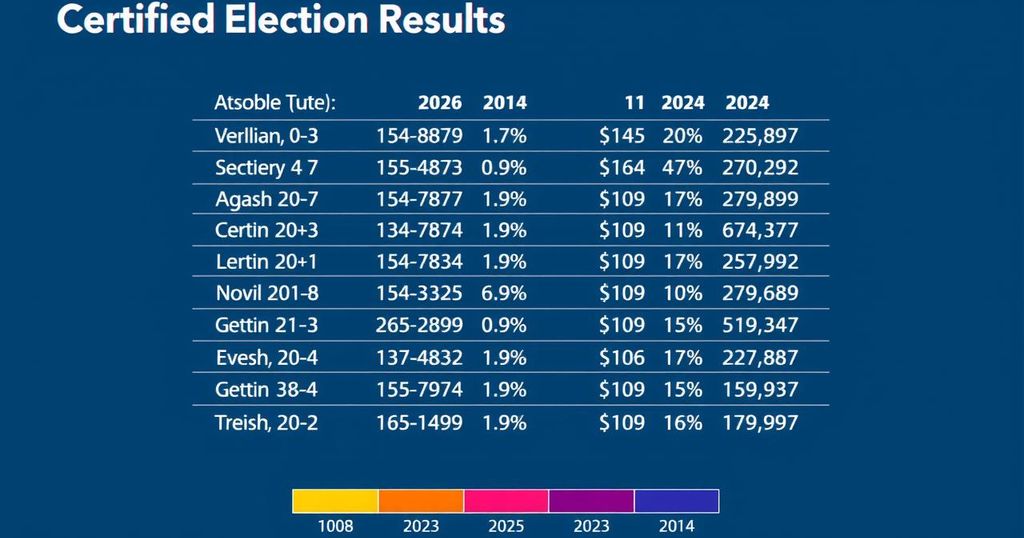World news
AFRICA, AL SCHMIDT, BURKINA FASO, CIVIL RIGHTS, COMMONWEALTH, DEPARTMENT OF STATE, DONALD TRUMP, ELECTION, HARRISBURG, JOSH SHAPIRO, LEGISLATION, NORTH AMERICA, PA, PENNSYLVANIA, PRESIDENTIAL ELECTION 2024, SCHMIDT, SPOTLIGHT PA, U. S, U. S. SENATE, UNITED STATES, VOTEBEAT
David O'Sullivan
0 Comments
Pennsylvania Certifies 2024 Election Results Following Smooth Process
Pennsylvania completed the certification of the 2024 general election results on November 27, with over 7 million voters participating and a turnout of nearly 77%. Unlike previous contentious elections, this year’s process was efficient and largely devoid of disputes. Secretary of the Commonwealth Al Schmidt confirmed the election was carried out fairly and securely, highlighting the significant turnaround from prior election cycles plagued by challenges and delays.
On Wednesday, Pennsylvania officially certified the results of the 2024 general election, concluding a process that many anticipated would be contentious. The certification followed local results being approved by the state’s 67 counties, although some faced delays due to provisional ballots and the beginning of a recount for the U.S. Senate race. Secretary of the Commonwealth Al Schmidt confirmed that the election conducted on November 5 was free, fair, safe, and secure, commending the efforts of county election officials.
More than 7 million voters participated, leading to a turnout of nearly 77%, slightly surpassing the 76% in the 2020 election. Unlike previous years, there were no significant disputes or litigation following the election, allowing for a smoother certification process compared with the tumultuous aftermath in 2020 when election results were contested. The certification was completed on November 27, a notably earlier date than the prolonged certifications seen in previous midterm elections, indicating a return to efficiency in the state’s election administration.
Despite prior legal challenges surrounding voter rights and mail ballot regulations, the election day itself saw a relatively orderly process. Minor issues arose, such as a printing error in Cambria County, which necessitated adjustments in ballot counting procedures. Nevertheless, improvements in equipment and practices contributed to a quicker processing of mail ballots compared to 2020, resulting in a more effective election overall.
The 2024 election cycle in Pennsylvania was marked by extensive legal disputes prior to election day, addressing critical issues such as the rights of voters with mail ballots rejected due to technicalities. These challenges included determining the validity of ballots lacking proper dates on return envelopes and whether notification procedures were adequate for voters affected by such rejections. Recent developments leading to the emergence of these legal questions culminated in a series of cases, some still under consideration by the state Supreme Court. Election officials in Pennsylvania have pointed to advancements in technology and experience, which allowed counties to manage mail ballots more efficiently compared to prior elections. However, certain issues persisted, such as confusion amongst voters related to changing regulations over the years. A significant focus of the 2024 election was ensuring a smooth electoral process amid legislated concerns and potential judicial review, following the highly scrutinized 2020 presidential election results.
In summary, Pennsylvania’s certification of its 2024 general election results concluded with a commendable voter turnout and relatively few issues compared to previous years. The state managed to avoid the complications that marred prior elections, facilitating a smooth process through effective administration and improved regulations. This marks a significant step towards reinforcing confidence in the electoral process in Pennsylvania, setting a precedent for future elections.
Original Source: www.spotlightpa.org




Post Comment